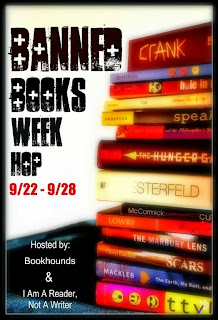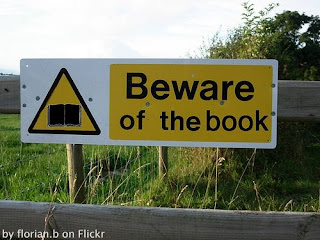It's that time again. The American Library Association's annual focus on books that have been banned or challenged begins tomorrow and runs all week long. Throughout the US, people regularly challenge books in school, libraries, and bookstores, trying to deny other people the right to read and the right to choose what they read.
The ALA's Office for Intellectual Freedom receives reports from schools, libraries and other organizations and compiles them into lists. You can see the various lists of frequently challenged books here.
Why are books challenged? Here are some statistics from the ALA's Frequently Challenged Books page:
Over this recent past decade, 5,099* challenges were reported to the Office for Intellectual Freedom.
Further, 274 materials were challenged due to "occult" or "Satanic" themes, an additional 291 were challenged due to their "religious viewpoint," and 119 because they were "anti-family."
- 1,577 challenges due to "sexually explicit" material;
- 1,291 challenges due to "offensive language";
- 989 challenges due to materials deemed "unsuited to age group";
- 619 challenged due to "violence"' and
- 361 challenges due to "homosexuality."
Please note that the number of challenges and the number of reasons for those challenges do not match, because works are often challenged on more than one ground.
I am capable of deciding for myself what books to read or not read. I often pass on books whose theme or topic don't interest me, and occasionally, offend me in some way.
As a teacher, part of my job is choosing books for my classrooms. I teach one, two, and three year olds so they are not reading in the strict sense but they are looking at the books, talking about them, and listening to the teachers read them. I need to consider their cognitive development, their social/emotional development, their interests, the current curriculum, my school's policy on books, and the National Association for the Education of Young Children's statement on books for young children. We have never, to my knowledge, had a parent challenge a book but we would stand behind any book in our school library. Sometimes children bring in books from home that don't meet our guidelines. In that case, we try to encourage that the book remain in their cubby but if they really want to to read it or want us to read it, we do. In the older groups, the teachers, at their discretion, can discuss with the child why we'd rather not have the book out in the room but it's handled on a case by case basis and no book is ever banned.
Obviously curating books gets trickier as children get older but I don't believe that any book should be banned from a classroom or school. The more exposure you have to people, places and events in the world, the more you learn. We learn, in part, through dissonance so bumping into ideas and concepts that make us uncomfortable is actually necessary in order to learn. Outside of a school setting I can't see any reason why someone else should have the right to determine what I read or don't read.
So, as my small contribution to the celebration of banned books, I've put up this post and I'm offering the children's book, "And Tango Makes Three". It was the fifth most challenged book in 2012, on the grounds of homosexuality and being unsuited for its intended age group. It's a book about compassion, love, and becoming a family; seems perfectly suitable to me.
The book will ship from The Book Depository so please make sure they ship to your country before entering. Please read my Giveaway Policy.
Also, this is a blog hop so be sure to visit the other blogs, read more about banned books, and see the variety of books being offered.
Blurb from goodreads ~
In the zoo there are all kinds of animal families. But Tango's family is not like any of the others. This illustrated children's book fictionalizes the true story of two male penguins who became partners and raised a penguin chick in the Central Park Zoo.
<!-- end LinkyTools script –>






















